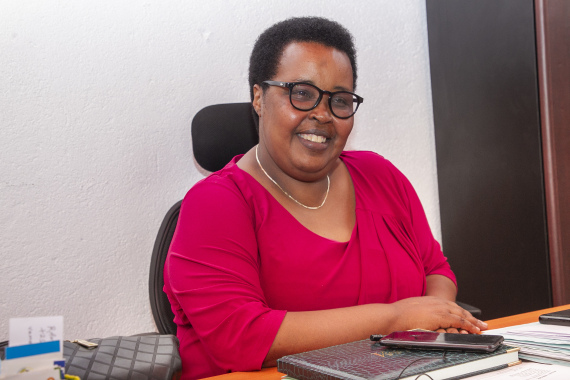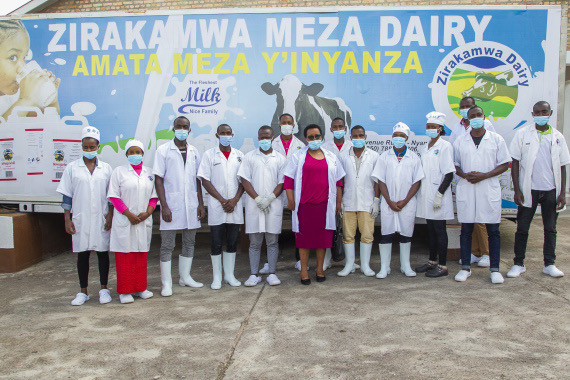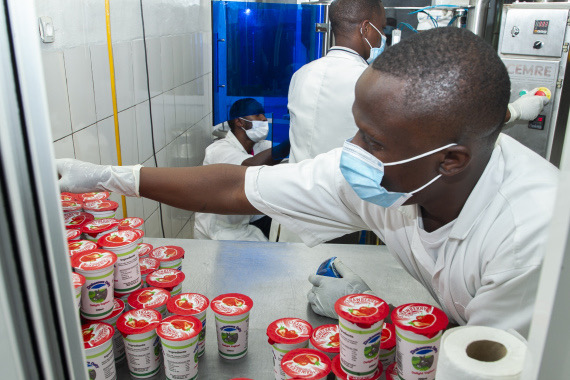From genocide widow to successful businesswoman — Rwandan woman walking out of shadow

By Xinhua
In an April rainy morning in Nyanza district, about a two-hour drive from the Rwandan capital city Kigali, Immaculee Kayitesi was seated at the counter of her dairy business, listening to the radio, while busy passing a bottle of sanitizer to one of her customers to sanitize his hands before buying milk products from her company.
Dozens of customers lined up waiting to be served with different milk products such as yogurt, pasteurized milk, and fermented milk in the shop while scores of workers were operating milk processing machines to convert milk into different end products in another section of the company, named Zirakamwa Meza Dairy.
“April rains remind of a dark and grave period we went through in April 1994 when Interahamwe militias attacked our village and killed my husband, family members, friends and neighbors.
The month of April is a dark period in my life that I will never forget,” said the 58-year-old, who became a widow during the 1994 Rwandan genocide against the Tutsi that claimed over one million lives, mainly ethnic Tutsis during the about 100 days starting from April 7.

Immaculee Kayitesi (C), owner of Zirakamwa Meza Dairy, posed for a group photo with employees of her company in Nyanza district, about a two-hour drive from the Rwandan capital city Kigali, on April 30, 2021. (Xinhua/Cyril Ndegeya)
Although almost all of her immediate family members including husband, parents, siblings, cousins as well as in-laws were killed during the genocide, the then secondary school teacher managed to escape from the killers by hiding in swamps and dense vegetation for one month until she came across Rwanda Patriotic Army soldiers, who later ended the genocide and turned into the national military. She had even thought she might be the last woman left standing in the whole Nyanza district because it was “almost impossible” to survive.
“I was terribly devastated and depressed after losing my husband before we could have any child because the genocide happened when we had spent only six months together after getting married,” said Kayitesi while wiping tears from her eyes.
That period of life was “hell on earth,” she said, adding that she was left with many scars like someone widowed at a young age. Even three years after the genocide ended, Kayitesi still faced all kinds of difficult and unexpected emotions from trauma, despair, profound sadness and grief but due to words of comfort from the current government, religious teachings, words of courage of the genocide widows association Avega Agahozo, meaning Association of Genocide Widows, she managed to pick up the pieces and focus on rebuilding her life rather than wallowing in sorrow.
In 1997, she got a job at Electrogaz, the predecessor of current Rwanda Energy Group and Water Sanitation Corporation, and was paid a monthly salary, which enabled her to start a small dairy shop, which is now estimated to be worth over 300 million Rwandan francs (about 305,000 U.S. dollars).At the beginning, she sold her milk to neighbors and passersby, but due to the high demand for milk, she came up with the idea of launching a dairy company. Around 1998, the brave woman quit her job and requested a loan of 400,000 Rwandan francs from a local commercial bank to expand her business.

An employee of Zirakamwa Meza Dairy arranged yogurt in Nyanza district, about a two-hour drive from the Rwandan capital city Kigali, on April 30, 2021. (Xinhua/Cyril Ndegeya)
In 2002 and 2013 respectively, she applied for more loans and eventually expanded a diary shop into a dairy milk processing company with a production capacity to process about 3,000 liters of milk per day. Every day on average, her company, which hires over 20 employees, sells about 500 packed yogurt containers of 150 milliliters, 1,000 liters of pasteurized milk and 300 liters of fermented milk.
The majority of the customers come from Kigali and the rest are from Nyanza and other neighboring districts such as Ruhango, Huye and Muhanga.
The company is only one km away from her family members. On April 22, she visited them at the Nyanza genocide memorial, the final resting place of over 24,000 genocide victims.








